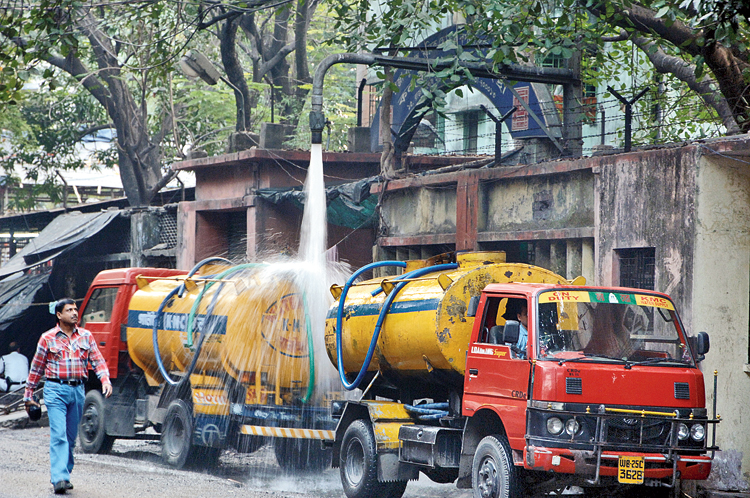A large number of Calcuttans who get their daily water after standing in queues in front of community taps should be made aware about the possible dangers around these public sources of water if they do not act responsibly, public health professionals have said.
They insist the civic body should clearly communicate to citizens to not touch a tap unless their hands are cleaned with soap and to maintain social distancing while waiting in a queue to collect water from a community tap or tankers sent by the Calcutta Municipal Corporation (CMC).
The civic body sends tankers to areas that lack a distribution network.
Public health experts said the CMC could ask its personnel to pour water from tankers into containers brought by people. The CMC personnel, the experts said, should maintain hand hygiene before doing so.
“The municipal corporation has to communicate the message to people on how to collect water. In many localities, especially in slums, people queue up to collect water from a community tap. The authorities have to clearly educate them about the need to touch the tap only with clean hands. Someone should not cough or sneeze while collecting water from a tap,” said V.K. Madhavan, the chief executive of WaterAid India, a non-profit organisation that works for improving access to clean water, clean toilets and hygiene.
“By now people have understood the need for social distancing, but the necessity of maintaining hand hygiene while using a common resource like a community tap needs to be emphasised, too. The CMC has a major role to play in this.”
Mohammad Mohiuddin, the head of the Bengal office of Unicef, too, stressed the importance of communication. “We have been telling people in districts where we work to maintain social distancing,” he said.
“It is the same protocol that has to be followed in market s and while standing in a queue to collect water. One must also be careful while touching a community tap that hundreds of people use,” said Mohiuddin.
Unicef runs its water, sanitation and hygiene programmes in Purulia, South 24-Parganas, Malda and Murshidabad.
A CMC official said it had asked the helper and driver of tankers to operate the taps. “The driver and helper are operating the taps. Others are not allowed to touch them. Besides, in some places people are leaving their containers and standing apart. Our personnel are using hosepipes and filling the containers. It is only after the tanker leaves that people come and collect their containers,” he said.
An expert said the CMC could spread awareness about the necessity of hand hygiene through loudspeakers, radio messages and by pasting posters.
An official in the CMC said 114 water tankers, each of 3,500 to 4,000litre capacity, were doing seven trips every day to provide water to some pockets.










